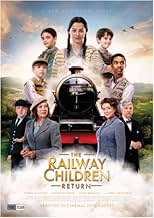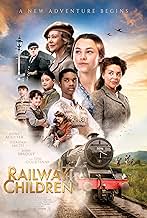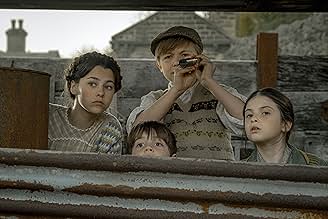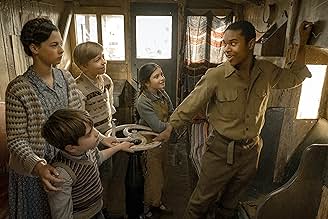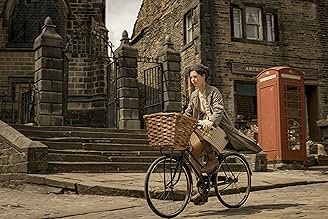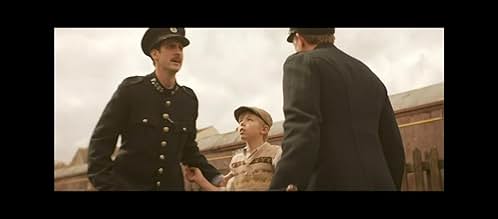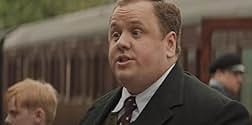PUNTUACIÓN EN IMDb
5,5/10
1,7 mil
TU PUNTUACIÓN
Sigue a un grupo de niños que son evacuados a un pueblo de Yorkshire durante la Segunda Guerra Mundial, donde se encuentran con un joven soldado que, como ellos, está lejos de casa.Sigue a un grupo de niños que son evacuados a un pueblo de Yorkshire durante la Segunda Guerra Mundial, donde se encuentran con un joven soldado que, como ellos, está lejos de casa.Sigue a un grupo de niños que son evacuados a un pueblo de Yorkshire durante la Segunda Guerra Mundial, donde se encuentran con un joven soldado que, como ellos, está lejos de casa.
- Dirección
- Guión
- Reparto principal
- Premios
- 1 nominación en total
Liam Dillon
- Amercian Officer
- (as Liam Dhillon)
Micky Williams
- Children's Dad
- (as Mickey Williams)
Reseñas destacadas
Every time I come across films of children being packed off to the countryside during WWII, 2 films invariably come to mind - Narnia, and Hope and Glory. Unfortunately, this neither has the fantastical element of Narnia, nor the magical perspective and childlike thrill of H&G.
For an adult director to recreate the world through the eyes of a child, requires huge amounts of perception and skill, both in direction as well as acting. This falters on both as neither is convincing enough to sustain the interest of the viewer throughout the duration of the film.
There are films where racial injustices are not only integral, but indispensable. But to force racial themes into every film film that could so easily be done without, is not only trivializing the issue but rather making a mockery of it as the audience would easily spot the digression and this is exactly what happens here.
Lastly as an aside, this period piece deals with racial justice in an era were there was little to none, compelling an unlikely amalgamation.
For an adult director to recreate the world through the eyes of a child, requires huge amounts of perception and skill, both in direction as well as acting. This falters on both as neither is convincing enough to sustain the interest of the viewer throughout the duration of the film.
There are films where racial injustices are not only integral, but indispensable. But to force racial themes into every film film that could so easily be done without, is not only trivializing the issue but rather making a mockery of it as the audience would easily spot the digression and this is exactly what happens here.
Lastly as an aside, this period piece deals with racial justice in an era were there was little to none, compelling an unlikely amalgamation.
There is nothing inherently wrong with this film, it is very sweet, quaint and positively intoxicating with its timeless charm of trains in the Yorkshire countryside. But the audience need something more to keep The film from being boring; it is simply not enough to recycle the same locations and the same plot points because from very early on this film just becomes a predictable tribute to the superior 1970s version.
An interesting point to note is how everyone from film critics to members of the public have complained about the secondary theme regarding racial inequality. Nobody was expecting nor wanted this theme in the film and subsequently it is quite jarring and feels out of place according to many people. I for one argue that in order for a period film to be successful nowadays it has to carry social related issues such as racial inequality in order for it to be able to relate to the wider public. After all, we are now so much more aware of racial related issues, ignoring it is hard to do.
In spite of the beautiful shots there was a really terrible continuity errors that were next to unforgivable and the hammy acting. Of the children left much to be desired when it came down to the casting director's choices.
This film will mostly have a fondness towards it, but it's destined to be consigned to TV as a Sunday afternoon filler.
An interesting point to note is how everyone from film critics to members of the public have complained about the secondary theme regarding racial inequality. Nobody was expecting nor wanted this theme in the film and subsequently it is quite jarring and feels out of place according to many people. I for one argue that in order for a period film to be successful nowadays it has to carry social related issues such as racial inequality in order for it to be able to relate to the wider public. After all, we are now so much more aware of racial related issues, ignoring it is hard to do.
In spite of the beautiful shots there was a really terrible continuity errors that were next to unforgivable and the hammy acting. Of the children left much to be desired when it came down to the casting director's choices.
This film will mostly have a fondness towards it, but it's destined to be consigned to TV as a Sunday afternoon filler.
Trading on the goodwill generated by the original,this quickly dispels any such feeling. A plot which has little of the warmth and charm of the original. It then tries to copy the climax of the original. The music is overbearing.
Interesting to see Tom Courtney,other than that a total non event.
Interesting to see Tom Courtney,other than that a total non event.
Where to start :
Good points : none
Pointless sequel, yet another example of the talentless chimps beating on keyboards to produce an awful script for a shameless money making grab on the back of a classic
I hope they paid Jenny Agutter a lot of money for her short appearances.
Absolute rubbish, full of 'woke' B. S.
If you have fond memories of the classic original don't waste your money.
Good points : none
Pointless sequel, yet another example of the talentless chimps beating on keyboards to produce an awful script for a shameless money making grab on the back of a classic
I hope they paid Jenny Agutter a lot of money for her short appearances.
Absolute rubbish, full of 'woke' B. S.
If you have fond memories of the classic original don't waste your money.
It was a good idea to update the railway children story of the Second World War but an absolutely dumb idea to put modern ideas of racism - presumably to please the woke crowd - into it. Come on this is a children's film. We know that racism existed in the American army but the enemy was not the Americans but the Nazis. Even the murderous Joe Stalin was on our side! The idiots who rewrite history like this give our children the wrong idea, that somehow the brave lads who went to war against one of the most murderous regimes ever were the bad guys. These things are just totally annoying and totally out of place in children's films. Another example of woke virtue signalling. The movie could've been made a lot more entertaining with a lot better and more imaginative screenplay. Hopeless!
¿Sabías que...?
- CuriosidadesUtilises the same Yorkshire locations as the 1970 film this story follows.
- PifiasThe blackout did not appear to be in force in Oakworth. In many scenes, from Lily climbing out of the window and running down the field with a torch, to front doors being opened in a blaze of light, there was no indication that a blackout was in force at all.
Blackout regulations started on 1st September 1939 and ended in May 1945. Rules were relaxed slightly in September 1944, but only to allow very low levels of lighting, no brighter than moonlight.
Lily's torch would have been pasted over with dark paper to dim the beam, or black paper with a slit in it.
Selecciones populares
Inicia sesión para calificar y añadir a tu lista para recibir recomendaciones personalizadas
- How long is The Railway Children Return?Con tecnología de Alexa
Detalles
- Fecha de lanzamiento
- Países de origen
- Sitio oficial
- Idioma
- Títulos en diferentes países
- Railway Children
- Localizaciones del rodaje
- Empresas productoras
- Ver más compañías en los créditos en IMDbPro
Taquilla
- Recaudación en Estados Unidos y Canadá
- 466.391 US$
- Fin de semana de estreno en EE. UU. y Canadá
- 245.904 US$
- 25 sept 2022
- Recaudación en todo el mundo
- 4.298.731 US$
- Duración
- 1h 39min(99 min)
- Color
- Relación de aspecto
- 2.35 : 1
Contribuir a esta página
Sugerir un cambio o añadir el contenido que falta







